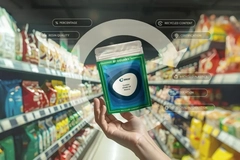
“Invercote coated with bioplastic – and everything guaranteed biodegradable – is an exciting product which we believe has a great future,” says Jonas Adler.

28 Jan 2010 --- Invercote from Iggesund Paperboard is now certified for industrial composting. The certification is proof that the natural material is biodegradable in accordance with the European standard EN 13432.
“We’ve never doubted it was but now we also have scientific documentation that it is,” comments Jan-Erik Winlund, product safety manager at Iggesund Paperboard. The composting certification opens new doors for Iggesund. Earlier this year the company announced that it can supply paperboard coated with bioplastic, a biodegradable barrier material that is especially well suited for food applications. The fact that the paperboard itself is now certified to be biodegradable paves the way for new business opportunities.
“Invercote coated with bioplastic – and everything guaranteed biodegradable – is an exciting product which we believe has a great future,” says Jonas Adler, who is commercial manager of Iggesund’s value-added products. He describes the company’s hunt for bioplastics that could meet its high quality demands. “There are a number of alternatives on the market but most of them cannot guarantee that they did not use genetically modified plants to produce the starch which is the raw material for the bioplastic. We chose to take the safest possible route and to refuse all products that cannot guarantee they are free from GMO material.
“In addition, there are cases where one or more ingredients in a total packaging solution do not measure up to the requirements for a sustainable strategy, and people have tried to gloss over the problem by adding a biodegradable plastic coating. We believe firmly that both the base board and the barrier material should live up to the same quality demands in terms of resource, energy and environmental strategies.”
Iggesund has chosen to cooperate with the Italian company Novamont and use its well-tested plastic Mater-Bi as a barrier material. “Invercote Bio, which is the name of our bioplastic-coated Invercote, is an exciting material for anyone who wants documented biodegradability,” Adler says. “There is quite a lot of demand for this feature in the market and we are proud that we can offer this material.”
Invercote Bio is more expensive than a paperboard with a traditional PE coating. “Companies that want sustainable packaging solutions are also prepared to pay for a material that rationalises their waste management,” Adler explains. “Instead of having to handle many different categories of waste, for instance at trade fairs, coffee and ice cream bars, and at various catering events, they can reduce their handling costs by choosing the right materials.”
He emphasises that while today’s bioplastics are not suitable for all types of applications, they are developing rapidly because so many different companies and organisations are working in this field.
“And paperboard coated with bioplastic has a fantastic future, because it fits into all the future waste scenarios prescribed in the EU’s packaging directive, be they recycling, energy recovery, composting or anaerobic treatment. No other material is suitable for all these different scenarios – and sharp-witted customers have already realised this.”












